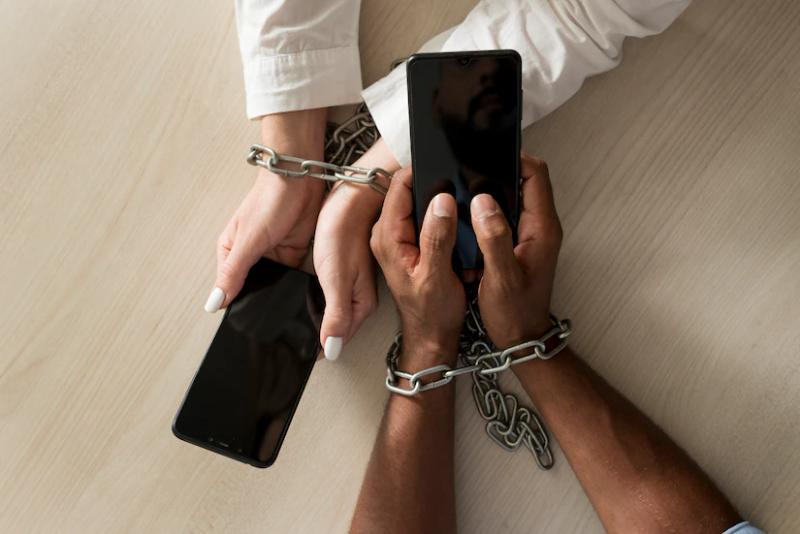Do you constantly text, surf the internet, send emails, use applications, and play games? Depending on how much time and effort you put into those situations, you may have a problem with excessive cell phone use.¶
The impact of this usage is staggering:#
• Reducing the quality of conversations.
• Adversely impacting short-term memory and problem-solving.
• Negatively affecting our sleep patterns.
• Resulting in more negativity, distress, and less emotional recovery in young children.
• Increasing obesity.
• And the positive correlation between smartphone addiction and depression is alarming.¶
• Studies have shown that spending too much time on your phone is bad for your focus and mental health.¶
Most people check their phones every 15 minutes or less, even with no alerts or notifications.¶
So what do I do now?¶
1. Don’t charge your phone near your bed#
Want to know the best way to keep your kids off their phones too much? Don’t allow them to charge their phones in their bedroom.
Many of the negative effects of overuse (poor sleep, hindered communication and intimacy) can be eliminated by keeping your cell phone out of your bedroom.¶
2. Change your phone settings#
The most common suggested ideas:
• Turn off notifications
• Set screen to black-and-white
• Remove distraction-based apps from your home screen
• Set a longer passcode
• Use airplane mode
• Turn on do not disturb
In my opinion, turning off notifications is something everyone should do regardless of how habitual their cell phone use is. Just because someone in the world wants to text you, email you, or tag you in a post on Facebook doesn’t mean they deserve your attention.¶
3. Set aside one day/week#
This is, by far, the most common approach I see among people who have taken intentional steps to curb their cell phone habits nowadays. Choose one day each week (usually a Saturday and Sunday) and set your phone aside. That’s it, make a habit of it.¶
4. Keep busy!#
If you have a specific plan for each day and you are focusing on your responsibilities, you will have less time to spend on your phone. The bonus is that you will spend more time focusing on your goals and being productive.
If you are not employed you can apply for jobs or volunteer at a local organization.
Try taking up a new hobby like knitting, sewing, or playing an instrument.
Spend more time doing things that need to be finished, whether it's chores or parents wanting a family day or time together.¶
5. Offer yourself rewards for less time spent on your phone.#
This concept is called positive self-reinforcement and it is used in therapy in order to teach individuals positive behavior through the use of a reward system. ¶
For example, if you meet your cell phone use goal for the day you can treat yourself to your favorite food, a new item, or an activity.¶
6. Remove Addictive Apps From the Home Screen#
Another handy little tip is to simply get rid of addictive app icons from your home screen. It may sound silly but, trust me, it works.¶
7. Start slow#
Instead of going cold turkey and completely eliminating your cell phone use (which can be very anxiety-provoking), begin by progressively reducing the amount of time you spend checking your phone.¶
For example, start by limiting the amount you check your phone
to once per 30 minutes, then once per 2 hours, and so on.
Keep a note of how many times you check your phone per hour.
Use your phone only for necessary communications or emergencies.¶
Wrapping up#
Here’s a short checklist that will help you spend less time on your smartphone and stop your phone addiction:
1. Pause for a couple of seconds before grabbing your phone and try to analyze why you do it.
2. Analyze your screen time and set time limits for the apps you use too much.
3. Hide the most distracting apps on the second page of the screen.
4. Consider deleting social media apps. If you need to, you can check your newsfeed in a browser.
5. Stay away from your phone after posting anything on social media. It’s too tempting to check your new likes and comments every 5 minutes.
6. Turn off notifications or keep them to a minimum.
7. Leave your phone in the bag while at home, work, or school.
8. Don’t use your smartphone before bedtime to have healthy sleep.¶
I finally realized it. People are prisoners of their phones, that's why they are called cell phones.















